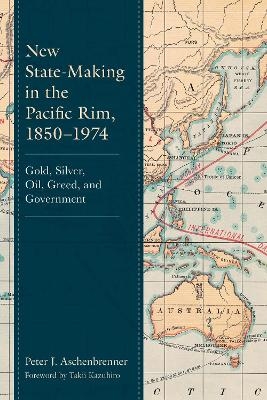
New State-Making in the Pacific Rim, 1850–1974
Gold, Silver, Oil, Greed, and Government
Seiten
2024
Lexington Books/Fortress Academic (Verlag)
978-1-6669-2189-2 (ISBN)
Lexington Books/Fortress Academic (Verlag)
978-1-6669-2189-2 (ISBN)
In the early 20th century, Pacific Rim governments urgently needed to rethink European colonialism. Aschenbrenner explains the strange history of ‘adaptation to survive’ that marked the struggle between arriving and resident populations in Australia, Japan and Canada and in the US territories (Hawaii and Alaska) from 1850 to 1974.
European colonial empires were built on private wealth-seeking (gold, silver and oil). These extractive activities required massive public subsidies. Drawing on the experience of three Pacific Rim nations — Australia, Japan and Canada and two territories in the US (Hawaii and Alaska) — New State-Making in the Pacific Rim, 1850-1974: Gold, Silver, Oil, Greed and Government demonstrates how 19th century colonialism contained the seeds of its own destruction. Peter J. Aschenbrenner identifies three factors that marked the turning point in the history of colonialism. First, governments demanded a greater return to the public treasury from private extractive activities and a reduced footprint (measured in environmental devastation and obliteration of local cultures. Second, first residents acquired considerable skill in ‘adaptation for survival,’ that is, fighting back against oppression (manifested in programs of extermination, forced population movement and hostility to language, religion and traditional subsistence practices). Third, colonial nations’ participation in World War I required their armed forces to fill manpower needs by calling on minorities to perform military service. This gave minorities significant leverage in their struggle to achieve equal political rights and access to their fair share of government benefits. Rethinking colonial practices became a realistic option, once national survival was at risk.
European colonial empires were built on private wealth-seeking (gold, silver and oil). These extractive activities required massive public subsidies. Drawing on the experience of three Pacific Rim nations — Australia, Japan and Canada and two territories in the US (Hawaii and Alaska) — New State-Making in the Pacific Rim, 1850-1974: Gold, Silver, Oil, Greed and Government demonstrates how 19th century colonialism contained the seeds of its own destruction. Peter J. Aschenbrenner identifies three factors that marked the turning point in the history of colonialism. First, governments demanded a greater return to the public treasury from private extractive activities and a reduced footprint (measured in environmental devastation and obliteration of local cultures. Second, first residents acquired considerable skill in ‘adaptation for survival,’ that is, fighting back against oppression (manifested in programs of extermination, forced population movement and hostility to language, religion and traditional subsistence practices). Third, colonial nations’ participation in World War I required their armed forces to fill manpower needs by calling on minorities to perform military service. This gave minorities significant leverage in their struggle to achieve equal political rights and access to their fair share of government benefits. Rethinking colonial practices became a realistic option, once national survival was at risk.
Peter J. Aschenbrenner is National Convenor (US) for the International Commission for the History of Representative and Parliamentary Institutions.
Foreword, Takii Kazuhiro
Acknowledgments
Introduction: ‘Maximilian Caesar is sacred throughout the vast world’
Chapter One: ‘Corporal Gellibrand received five shillings’
Chapter Two: ‘Knowledge shall be sought throughout the world’
Chapter Three: ‘Wider still and wider shall thy bounds be set’
Chapter Four: ‘Approximately 984,000 acres was not conveyed to the common people’
Chapter Five: ‘Indians have no voice in the government of the town’
Chapter Six: ‘Oh by God, I gotta de gold!’
Chapter Seven: ‘We're professional problem-solvers.’
Appendix
Bibliography
About the Author
| Erscheinungsdatum | 16.08.2024 |
|---|---|
| Vorwort | Takii Kazuhiro |
| Sprache | englisch |
| Maße | 160 x 236 mm |
| Gewicht | 531 g |
| Themenwelt | Geschichte ► Allgemeine Geschichte ► Neuzeit (bis 1918) |
| Geisteswissenschaften ► Geschichte ► Regional- / Ländergeschichte | |
| ISBN-10 | 1-6669-2189-0 / 1666921890 |
| ISBN-13 | 978-1-6669-2189-2 / 9781666921892 |
| Zustand | Neuware |
| Haben Sie eine Frage zum Produkt? |
Mehr entdecken
aus dem Bereich
aus dem Bereich
Europa 1848/49 und der Kampf für eine neue Welt
Buch | Hardcover (2023)
DVA (Verlag)
CHF 67,20
Giordano Bruno - ein ketzerisches Leben
Buch | Hardcover (2024)
C.H.Beck (Verlag)
CHF 41,85


